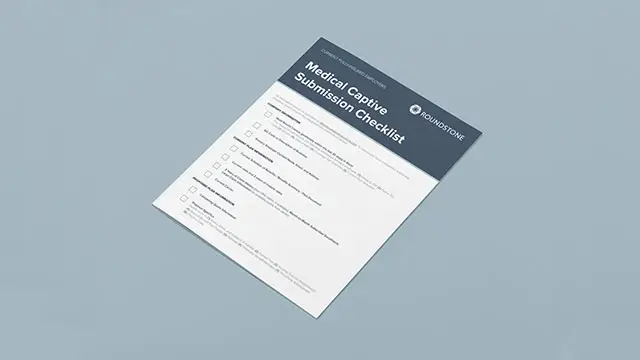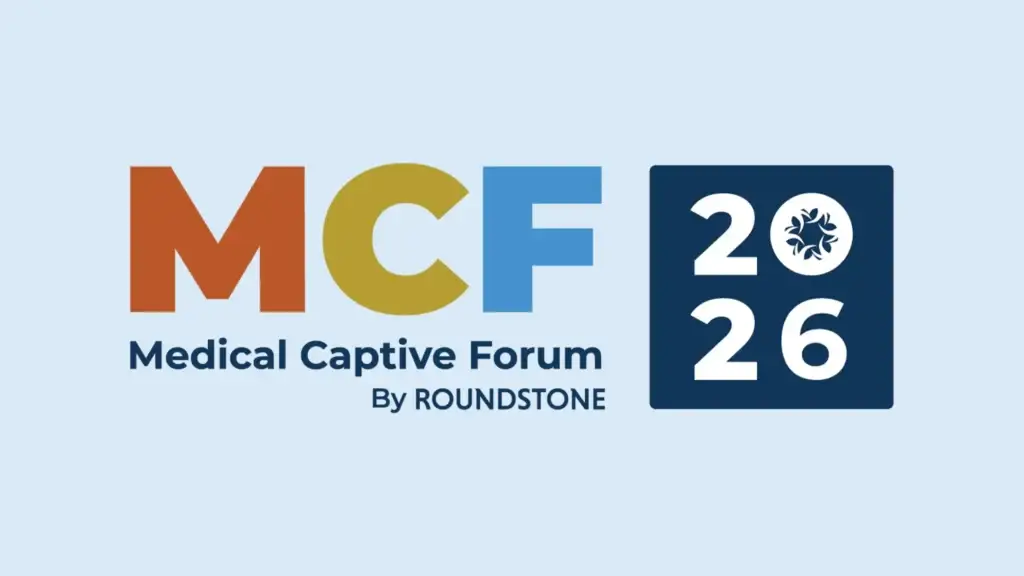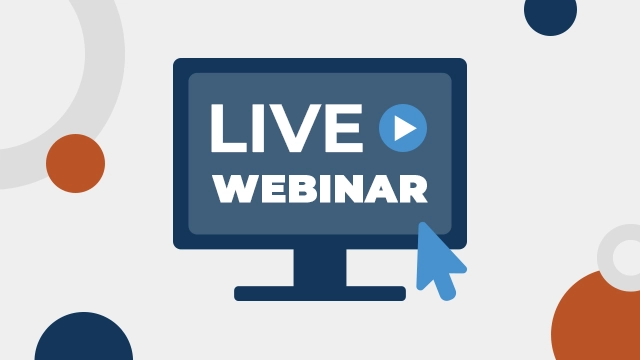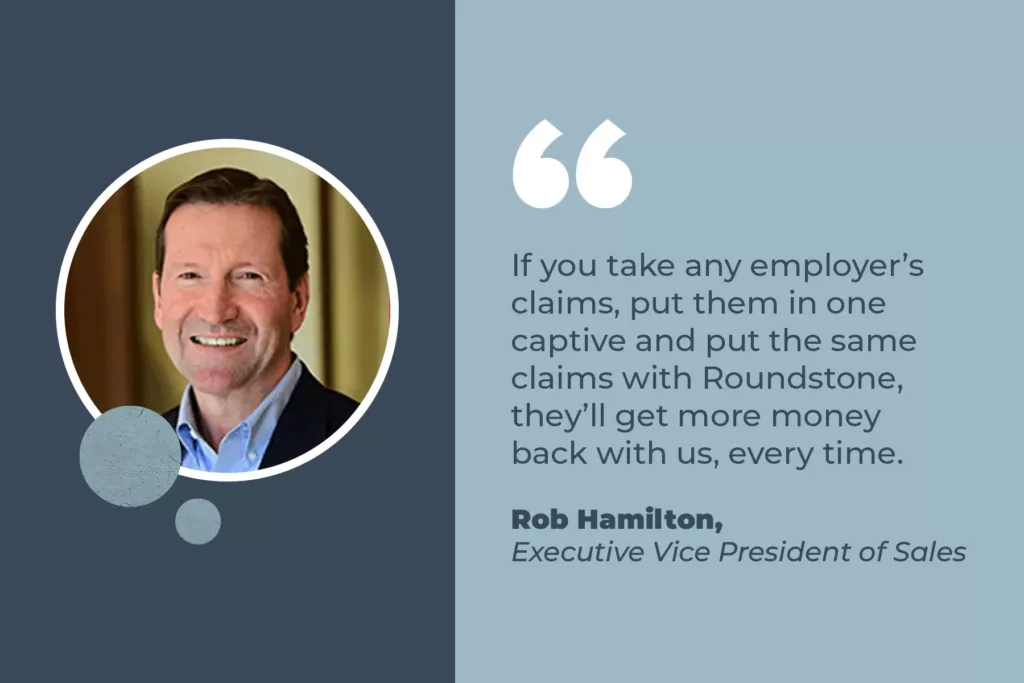Highlights
- Because group stop-loss captives differ dramatically in collateral, cash distributions, and flexibility, many advisors prefer a single captive they recommend exclusively to clients.
- Roundstone offers many advantages over other captives – lower collateral, lower fixed costs, and cash distributions returned to employers.
- Faced with escalating healthcare costs, more employers are demanding solutions like stop-loss captives because the current model is unsustainable.
As Roundstone’s Executive Vice President of Sales, Rob Hamilton has clocked his fair share of time on the road. He’s tried the free breakfast of nearly every hotel chain and knows all the best sushi joints and steakhouses scattered across America. Along the way, he’s gathered some valuable truth nuggets regarding self-funding, sayings that describe the group captive experience in a nutshell.
One of his favorites is this: “If you know one captive, you only know one captive.” He first heard this from an advisor who vetted several group medical captives before finally deciding on Roundstone.
“Self-funding in and of itself can be complicated, especially to a midsize employer that’s been fully insured since inception,” Rob said. “Once you’ve added the captive component, you’ve jumped into the deep end of the pool.”
Sure, as an advisor, you’ll shop and compare features of various stop-loss captives before recommending one to clients. You might consider the cost of collateral, the size of the captive loss or return fund, or whether the captive pays cash distributions or returns unused claims funding back to captive members.
Like shopping for a car, you’ll weigh various metrics of different models on the lot, but it’s unnecessary to be an expert on each. It helps to be an informed shopper – but you don’t need to be an automotive engineer.
“It’s virtually impossible for an advisor to be a true expert on two to three different captives,” Rob explained. “They’ll weigh the pros and cons and pick one – and they’ll recommend that captive almost exclusively to their clients.”
Why That One Captive Should be Roundstone
Rob would be the first to admit he’s a little biased, but he has several tried-and-true reasons why Roundstone should be your choice of captive to know for a self-funded health insurance solution.
First, Roundstone has the lowest fixed costs of any captive in the industry – 30%. Most captives’ fixed costs range anywhere from 35% to 45%. Your fixed costs include your operational costs, reinsurance, and taxes. Your variable costs include your claims. Naturally, you want a low fixed cost, high variable cost ratio because it allows for better returns on stop loss premiums when claims are lower than expected.
“If you take any employer’s claims, put them in one captive and put the same claims with Roundstone, they’ll get more money back with us, every time,” Rob said. “That’s because of our lower fixed costs. It’s simply a more cost-efficient model.”
Roundstone maintains the lowest fixed costs of any other captive in the industry because of our size and because we’ve negotiated with partners like fronting carriers and reinsurers to lower those costs. We always pass those savings on to the employers. We haven’t changed our underwriting or management fees since our early beginnings.
Second, Roundstone prioritizes employer alignment – everything we do is in the best interests of the employer and their employees. We have an open platform with a pass-through approach that passes all savings onto the employer. We never earn commissions from TPAs, PBMs, or other solution partners. Every recommendation we make is purely designed to deliver better outcomes for captive members.
Roundstone returns all savings to the employer – pharmacy rebates, cost saving solutions, reduced healthcare costs – the employer benefits from every dime. Our end game is always happy and satisfied clients. We earn our bread and butter through steady growth and consistent renewals.
Part of our alignment vision comes from the fact that Roundstone is a family-owned, privately-held stop-loss captive – unlike other captives on the market owned by private equity firms. We’re not beholden to a board; we’re not motivated by stock price. Everything we do is in the best interest of the employer.
Third, Roundstone always provides transparency – not just on your claims data, but on the actual performance of the captive. Unlike other captives on the market, Roundstone provides quarterly captive performance reports, so you always know how not only your company but the captive overall is performing. That way you can keep a pretty good tally on your expected distribution return throughout the year.
Of course, captive performance is a moot point for most captives because they don’t return distributions – or they use it as a credit for next year or count it as collateral. They prefer to keep your money for themselves.
We’re different. We understand that money is yours. You deserve to have it back. Roundstone always returns any unused claims spend, pro-rata, back to captive members at the end of the year. We pay this distribution in cash, about six to seven months after the policy year concludes.
As an advisor, that’s a check you get to deliver personally to your clients – the perfect opportunity to be their hero in winning the benefits game.
Roundstone Offers a Turnkey Solution
At Roundstone, we like to keep things under one roof. There’s less friction and it’s easier to meet the needs of employers quickly and proactively.
“Roundstone is the only captive that offers a completely integrated, turnkey operation,” Rob said.
Roundstone is a managing general underwriter (MGU) – we underwrite all our risk in-house. As an advisor, you have personal access to our in-house underwriters. You can tap into their expertise and insight, enabling a deeper understanding of whether a policy suits your client’s needs. Moreover, it provides the opportunity to tailor the policy more effectively to address the specific healthcare concerns of your client.
In-house underwriting also allows us to price policies by the book. We can take a more disciplined approach to bringing on risk compared to the fully insured market, even when claims information is often not readily available. We never shadow-price – naming a price just to match what a competitor is offering – or use maximum allowable discretionary discounts just to write business. This leads to more consistent, stable renewals, so your clients don’t need to shop for a new policy every year. Roundstone delivers consistent business, which is great for both maintaining and growing your book.
Roundstone also issues our own stop-loss policy. We adjudicate all our claims in-house. That allows us quicker turnaround, more direct communication, and the ability to clear up confusion promptly. We’re more in control – and that’s a great benefit to you and your clients. We can meet your needs more efficiently because we don’t need to rely on third parties. We can get faster turnaround time on issuing policies as well as renewals.
Our in-house approach also applies to your data and cost containment. We have our own Cost Containment Investigators (CSI) – data specialists who comb through your data to offer cost savings recommendations to further improve the savings of your self-funded health plan. These recommendations are only suggestions. We never mandate cost saving solutions. It’s your plan. You’re free to design it as you’d like.
Roundstone also offers its own in-house TPA, Bywater, which specializes in captive funding. You have the option to work with other approved TPAs, or we can also make recommendations from a selection of our preferred TPAs.
Why Roundstone is Great for Advisors
As an advisor, you’re driven by three things:
1. Growing your business.
2. Retaining your book of business.
3. Differentiating your value proposition.
Roundstone can help with all three.
Employers are cash-strapped by escalating renewals. We can help you help them get off the escalator of increasingly high premiums. It’s more than just a sales pitch. It’s the Roundstone Guarantee. We promise your clients will save money over five years compared to a traditional plan, or we’ll refund them the difference.
In fact, two-thirds of Roundstone clients save enough in their first four years to completely pay for their fifth year of claims. And 100% save money, full stop.
Roundstone has a high retention rate of 90% to 95%. Our renewals are consistent and easy.
We offer the best-performing captive for the reasons stated above. We help you differentiate your value proposition by offering clients a viable solution to out-of-control healthcare benefits. Your clients deserve affordable benefits — their employees demand great care. Roundstone delivers both.
Why Roundstone is Great for Employers
Roundstone benefits employers through a transparent approach to their data. Unlike fully insured or level funded, our Captive provides intricate, HIPPA-compliant access to your claims data. We like to say that the data drives the strategy.
“You can do a root cause analysis with your data,” Rob said. “We gather the data, team you up with smart data specialists who can help you figure out what the problem is. Then we formulate a strategy to fix the problems. This results in cost savings that directly benefit the employer.”
Roundstone also delivers a flexible, open platform. Employers can make alterations to their plan mid-year to save money and improve care. It’s their plan. They are in the driver’s seat.
With Roundstone, employers also pay the lowest collateral than any other captive – 7%, paid once upon entry to the captive. Most captives charge collateral between 11% and 15%, though sometimes it can be as high as 25%. And some require stacked collateral – meaning you have to pay two years in a row.
What is collateral? It’s a percentage of the stop-loss premium, essentially your price of admission into the captive. Collateral provides a safety net – it’s the amount you pay to protect yourself in case the healthcare costs of your employees go way above what you expected. It covers any unexpected costs that might be more than the amount the captive has received as premium. However, in a well-established captive like Roundstone, the likelihood of having to dip into the collateral is exceedingly rare.
Most captives or level-funded plans keep a portion or all of the collateral if you leave the plan. Roundstone is different. If you leave the captive, any unused collateral is refunded back to you 100%. We don’t believe in handcuffs.
Cash-strapped Employers Demand Better Care
The market for alternative health insurance solutions has grown.
“It’s growing so dramatically because of high demand,” Rob said. “There’s so much pain in the marketplace. The current model is unsustainable. You get a 20% to 40% increase every year, and in four years your costs are going to double. Employers used to shift those costs to employees, but they can’t do it anymore. Costs are just too high.”
The growing popularity of captives is one reason Roundstone has maintained a consistent 30% growth rate over the last several years. People are catching on, Rob said.
“Ten years ago, our sales reps would get asked, ‘Hey, tell me about this captive thing,’” Rob said. “Now people are asking, ‘Why is your captive different from the others?’ The word has spread. Employers are telling their advisors they need a better alternative.”
Your clients want you to do your homework. Crunch your options. Run the numbers. Talk to other advisors. We promise Roundstone will stand out.
Send us the RFPs for the groups you’re working on. Let’s see how we can help your clients start saving money.












